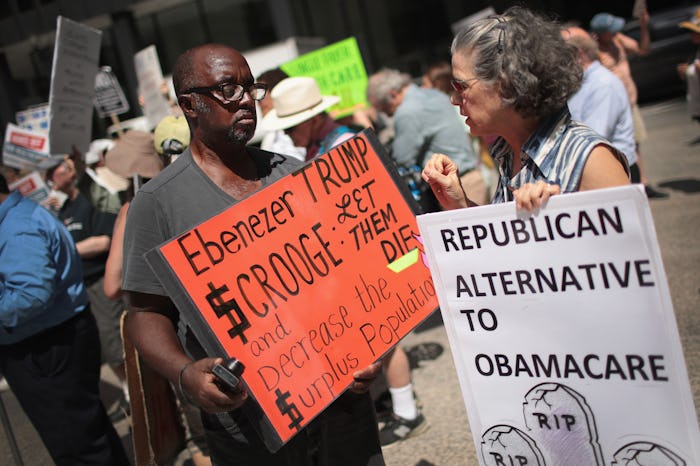Life

This One Fact About The BCRA & AHCA Should Infuriate Everyone
On Monday, the Congressional Budget Office released its official forecast on the Better Care Reconciliation Act, the Senate Republican plan to replace the Affordable Care Act. As expected, the numbers were grim: 22 million fewer people insured by the year 2026. Like the American Health Care Act passed by the House last month, the Senate version also relies on a kind of reverse Robin Hood approach to health coverage: more help for people who are healthy and rich, and less help for the sick and poor. But a deeper dive on the tradeoff in the Senate health plan published by Vox this week uncovered one fact about the BCRA and the AHCA that should infuriate nearly everyone: The redistribution of wealth and opportunity in both bills is far worse than many had feared.
For the most part, the Senate bill looks much like the House Republican bill passed early last month. Like the AHCA, the BCRA still hinges on a harsh rollback of the Medicaid expansion that covers millions of low-income Americans. Both plans include deep cuts in actual Medicaid funding — and will ultimately mean cutting the number of people able to get Medicaid, according to Vox.
More than that, the bill still guts the amount of help that individuals get for health coverage on the marketplace, which means more people will be forced to choose plans that offer less actual insurance and higher deductibles.
Prior to the CBO statement — which estimates that the BCRA would reduce the federal deficit by $321 billion — the Center on Budget and Policy Priorities assumed the BCRA would be in the same ballpark as the House version, with 10-year tax cut totals at roughly $756 billion. And according to that same analysis, the gains from those tax cuts would be concentrated in the wealthiest American households: those with earnings at around $300 million a year.
Only 400 households fit that category, but between them those taxpayers could receive tax cuts worth upwards of $33 billion from 2019 through 2028, according to the CBPP website. The tax savings in just those 400 households is more than what the federal government would save by ending Medicaid expansion in any one of 20 expansion states and the District of Columbia, the CBPP reported. Vox put the cuts in even sharper terms:
“It’s hard to wrap your head around that disparity,” wrote Sarah Kliff and Javier Zarracina. “400 families gaining a tax cut that is offset by ending a program that covers three-quarters of a million of low-income Americans.”
That exactly the kind of criticism that Democrats and industry leaders have been pointing to since Senate Republicans released a draft of their health plan last week. Former President Barack Obama even entered the fray with a Facebook post saying that the Senate bill wasn’t a health care plan at all, but actually a “massive transfer of wealth” from the rich and healthy to the poor and sick. He continued:
If there’s a chance you might get sick, get old, or start a family – this bill will do you harm. And small tweaks over the course of the next couple weeks, under the guise of making these bills easier to stomach, cannot change the fundamental meanness at the core of this legislation.
Of course, there’s remains the question of whether Senate Republicans will shift course on BCRA now that the projections have begun rolling in. Still, where we are currently is difficult to comprehend: Taking from millions of poor families to benefit a handful of the wealthiest has been the underpinning of GOP health policy proposals from both chambers of Congress.